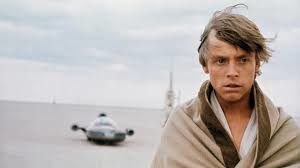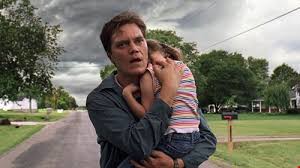Fictionalizing Your Real-Life Story

We said a few posts ago that sometimes we, as writers, have to tart real life up.

Mark Hamill as Luke Skywalker on the evaporator farm on Tatooine
Real life is too ordinary.
It’s too interior.
It’s too boring.
We have to heighten the drama, ramp up the stakes. Otherwise readers won’t care.
But how, exactly, do we perform this wizardry?
Do we just dream up wild stuff—sex, violence, zombies—and hurl it into the stew willy-nilly?
How do we know what’s appropriate?
How can we tell when we’ve gone too far?
The answer brings me back to my favorite subject: theme.
The principle is:
We may fictionalize but only on-theme.
I was watching the movie Midnight Special (2016) last night. Have you seen it? It’s good. The film stars Michael Shannon, Joel Edgerton, Kirsten Dunst, and Adam Driver. The plot follows a young boy who possesses mysterious powers as he flees apocalyptic cultists and the NSA, protected by his father. I won’t spoil the climax for you except to say that it is wildly fictionalized … and it works completely.
Why?
Because the filmmakers fictionalized on-theme.
Midnight Special is about a father’s love for his son and the passage the father must endure to face ultimate separation. That’s the core. That’s what the story’s really about.

Michael Shannon and Jaeden Lieberher in “Midnight Special”
An alternative version could have been told very simply: a special young boy gets sick and dies, despite heroic efforts to save him by his father and mother. Perhaps that was the real story from which Midnight Special evolved.
The filmmakers ramped up the tale’s power by making the boy special special special, i.e. possessed of powers that can bring satellites down out of the sky and cause the entire US government to chase him halfway across the country.
We may fictionalize all we want, as long as we stay on-theme.
When Ernest Hemingway gave Jake Barnes, his fictional protagonist in The Sun Also Rises, an emasculating war wound, he was heightening reality indeed. But that heightened reality was 100% on-theme.
The theme of The Sun Also Rises is the soul-devastation that the horrors of WWI wreaked upon Hemingway’s “Lost Generation” contemporaries. Hence the wound.
There’s a storytelling axiom in Hollywood:
If horses can fly, you’ve got a story. If everything can fly, you’ve got a mess.
When we fictionalize on-theme, we heighten the drama legitimately. When we make sh*t up off-theme, we just produce craziness.
The first principle we talked about in this series was
Make the internal external
Or put another way
Make the invisible visible.
We can make ourselves cowboys or princesses or private eyes as long as that external story is on-theme with our real-life internal one.
What was Rocky but Sylvester Stallone’s fictionalized-on-theme rendition of his own struggles as an unknown trying to get noticed in the movie biz?
What was Luke Skywalker’s journey from the evaporator farm on Tatooine to saving the galaxy as a Jedi knight, except George Lucas’ own odyssey from his boyhood in Modesto, California to entertainment immortality? For that matter, what was American Grafitti?
Fictionalize as much as you want, but keep it on-theme.




Hey Steve thats a photo from Take Shelter (another amazing Michael Shannon film).
On another note — it sounds so dumb but how do I know what my theme is? I feel like I can’t commit to a full understanding of it and I remember you saying sometimes you need an editor to TELL you because when you’re writing you can’t see the Forrest from the trees….
do you have a blog post about unearthing your theme? How to discover it? Maybe questions to ask yourself? Maybe a list of other films themes as examples?
I know I will be set free if I can figure this out.
Thanks so much for all your posts!!
Katie
Thanks for repeatedly beating the theme drum…I try to think of theme as True North now, keeping my eyes on it at all times.
Good stuff!
I watched “Midnight Special” the other night too. Great flick! I love stories about cults. I’m fascinated by how belief systems are created and cultivated. I’m intrigued by the charisma required to maintain “religious” dogma in the modern day.
One of the cool things about “Midnight Special” and “Star Wars” is the leniency in which “magic” is distributed. It makes me think of the opposite too…
Like, Harry Potter.
He entered the wizarding world as a normal boy. His journey was coming of age, and attempting to understand his place, in a world where “magic” is the norm.
Steve? You’re brilliant.
Took the tip and watched Midnight. I can see how a story like this could come from a new father. Seeing his child as something entrusted to him from another world. Willing to sacrifice everything to shepherd that child forward on a road he can’t see the end of.
Maybe a similar theme with Cormac McCarthy and The Road. He got the idea about a dozen years ago when traveling with his own young son.
“He knew only that his child was his warrant. He said: If he is not the word of God God never spoke.”
Hi Steven,
I just finished “The Knowledge” and really enjoyed it. I like the short, punchy chapters and yes, I laughed out loud several times. My question may be a little basic, but what made you structure it into 8 “books”?
I’ve gotten so much out of “Writing Wednesdays”, “The War of Art”, and “Nobody Wants to Read Your Sh*t”. Thanks so much for this series on adapting real-life and your generosity of spirit!
Thank you ..could you elaborate more the meaning of “on theme”..? thanks